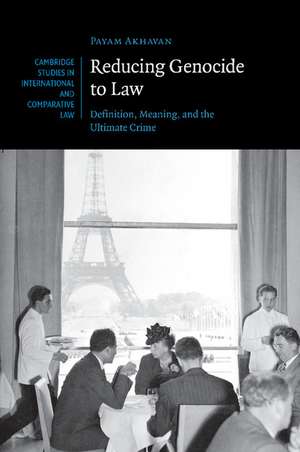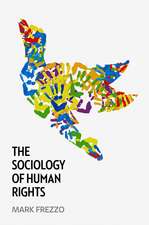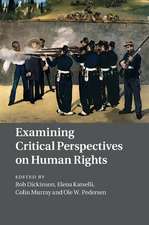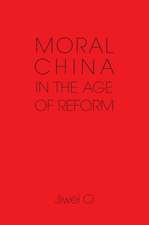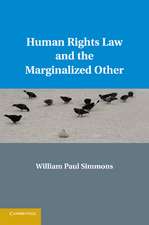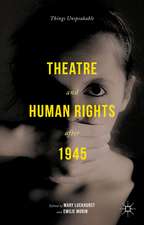Reducing Genocide to Law: Definition, Meaning, and the Ultimate Crime: Cambridge Studies in International and Comparative Law, cartea 87
Autor Payam Akhavanen Limba Engleză Paperback – 31 dec 2014
| Toate formatele și edițiile | Preț | Express |
|---|---|---|
| Paperback (1) | 280.74 lei 6-8 săpt. | |
| Cambridge University Press – 31 dec 2014 | 280.74 lei 6-8 săpt. | |
| Hardback (1) | 722.43 lei 6-8 săpt. | |
| Cambridge University Press – 25 ian 2012 | 722.43 lei 6-8 săpt. |
Din seria Cambridge Studies in International and Comparative Law
- 9%
 Preț: 731.44 lei
Preț: 731.44 lei -
 Preț: 231.88 lei
Preț: 231.88 lei -
 Preț: 233.37 lei
Preț: 233.37 lei -
 Preț: 201.40 lei
Preț: 201.40 lei -
 Preț: 231.74 lei
Preț: 231.74 lei -
 Preț: 176.91 lei
Preț: 176.91 lei - 9%
 Preț: 661.95 lei
Preț: 661.95 lei -
 Preț: 230.94 lei
Preț: 230.94 lei - 9%
 Preț: 765.91 lei
Preț: 765.91 lei -
 Preț: 237.53 lei
Preț: 237.53 lei - 9%
 Preț: 773.85 lei
Preț: 773.85 lei -
 Preț: 329.28 lei
Preț: 329.28 lei - 14%
 Preț: 793.62 lei
Preț: 793.62 lei -
 Preț: 238.11 lei
Preț: 238.11 lei - 9%
 Preț: 596.72 lei
Preț: 596.72 lei - 9%
 Preț: 593.37 lei
Preț: 593.37 lei -
 Preț: 209.41 lei
Preț: 209.41 lei - 9%
 Preț: 917.66 lei
Preț: 917.66 lei -
 Preț: 239.72 lei
Preț: 239.72 lei - 11%
 Preț: 639.92 lei
Preț: 639.92 lei -
 Preț: 350.03 lei
Preț: 350.03 lei - 14%
 Preț: 784.65 lei
Preț: 784.65 lei -
 Preț: 310.86 lei
Preț: 310.86 lei - 14%
 Preț: 731.56 lei
Preț: 731.56 lei - 14%
 Preț: 721.96 lei
Preț: 721.96 lei - 14%
 Preț: 698.80 lei
Preț: 698.80 lei - 14%
 Preț: 896.01 lei
Preț: 896.01 lei -
 Preț: 288.04 lei
Preț: 288.04 lei - 14%
 Preț: 757.69 lei
Preț: 757.69 lei -
 Preț: 284.78 lei
Preț: 284.78 lei - 11%
 Preț: 642.00 lei
Preț: 642.00 lei - 9%
 Preț: 661.91 lei
Preț: 661.91 lei -
 Preț: 358.28 lei
Preț: 358.28 lei - 14%
 Preț: 700.76 lei
Preț: 700.76 lei - 14%
 Preț: 760.17 lei
Preț: 760.17 lei - 9%
 Preț: 662.74 lei
Preț: 662.74 lei - 14%
 Preț: 703.42 lei
Preț: 703.42 lei -
 Preț: 363.28 lei
Preț: 363.28 lei -
 Preț: 464.33 lei
Preț: 464.33 lei -
 Preț: 324.79 lei
Preț: 324.79 lei -
 Preț: 320.75 lei
Preț: 320.75 lei -
 Preț: 288.80 lei
Preț: 288.80 lei
Preț: 280.74 lei
Nou
Puncte Express: 421
Preț estimativ în valută:
53.72€ • 57.44$ • 44.79£
53.72€ • 57.44$ • 44.79£
Carte tipărită la comandă
Livrare economică 18 aprilie-02 mai
Preluare comenzi: 021 569.72.76
Specificații
ISBN-13: 9781107480056
ISBN-10: 1107480051
Pagini: 210
Ilustrații: black & white illustrations
Dimensiuni: 152 x 229 x 11 mm
Greutate: 0.29 kg
Editura: Cambridge University Press
Colecția Cambridge University Press
Seria Cambridge Studies in International and Comparative Law
Locul publicării:New York, United States
ISBN-10: 1107480051
Pagini: 210
Ilustrații: black & white illustrations
Dimensiuni: 152 x 229 x 11 mm
Greutate: 0.29 kg
Editura: Cambridge University Press
Colecția Cambridge University Press
Seria Cambridge Studies in International and Comparative Law
Locul publicării:New York, United States
Cuprins
1. The power of a word; 2. The taxonomy of crimes; 3. The core elements of international crimes; 4. A hierarchy of international crimes?; 5. Naming the nameless crime; 6. Who owns 'genocide'?; 7. Contesting 'genocide' in jurisprudence; 8. Silence, empathy, and the potentialities of jurisprudence.
Recenzii
'Without a doubt, the first half of the book is the best, as it deals with what Akhavan clearly knows inside and out: domestic and international criminal law … Akhavan provides an excellent analysis of the International Criminal Tribunal for the Former Yugoslavia and International Criminal Tribunal for Rwanda's jurisprudence on the crime of genocide as well as a solid review of the many debates surrounding the meaning, legal and otherwise, of this particular atrocity.' Maureen S. Hiebert, Canadian Yearbook of International Law
Notă biografică
Descriere
Why is genocide the 'ultimate crime' and does this distinction make any difference in confronting evil?
